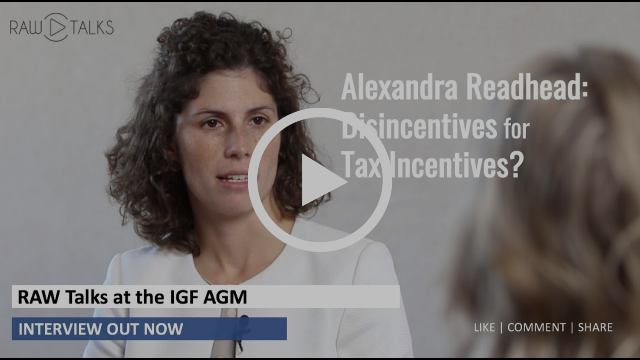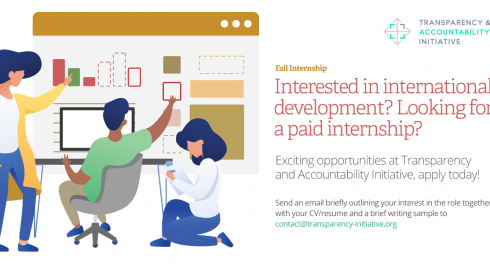Highlights:
- Collaborative no-nos
- Global compassion crisis
- Star gazing
- Bringing corporate tax systems into the 21st century
- Open and inclusive government
- Publish what you finance
- Making the case
- TAI spotlight: From jokes for justice to updated evaluation guidance
In case you missed it…
Collaborative no-nos
 Photo: Marc Liu from Unsplash
Photo: Marc Liu from Unsplash
Donor collaboratives rarely get the spotlight (even though we are fascinating!!). So, we were glad to see Lindsay Burns reflect on what factors can lead collaboratives to fail. Her points resonate – at least for the early phase. Coping with shifts in donor strategies and expectations over time further complicate matters. We await Lindsay’s take on factors for success. One area where funders can push each other is not letting their systems get in the way of potential. Ann Mei Chang asks nonprofits if they would “include something in a proposal that you believe would likely result in 30% greater impact, if it made you 10% less likely to win the grant?” Would you take those odds?
Global compassion crisis
CIVICUS released their annual state of civil society report which disclosed that the world faces a crisis of global compassion. While repressive government tactics are on the rise globally, so are broader public attacks on vulnerable groups. Does vilification undermine empathy and the potential for constructive debate? Sounds like a question to debate at the upcoming International Civil Society Week in Belgrade.
Thought that repressive laws on civic space are only passed by authoritative regimes or developing countries? Chrystie Swiney highlights how even strong democracies are passing laws restricting civil society. To understand more of these restrictive laws, check out a new compendium of laws and legal resources around the world on evolving Internet regulation shaping intermediary liability and Internet users’ rights worldwide by The Center for Internet and Society at Stanford Law School. Their map will help you identify places where legal regimes balance—or fail to balance—regulatory goals with freedom of expression and other civil liberties.
How are countries performing in terms of access to public information law? In Ukraine, a landmark right to information (RTI) law was adopted in 2011, bumping them up a spot in the top ten Global Right to Information Ratings in 2012. Check out an overview of the current state the law. Elsewhere, Ghana should see its ranking improve next year, having finally passed their major RTI law, 22 years after its introduction. For a bigger picture view of grantee pain points in case of repression and funder responses to date, check out TAI’s Compendium of resources.
Star gazing
Having just been involved in our own Fiscal Futures 2040 scenarios process, we were intrigued to see an alternative vision from the European Commission. The Commission released their Future Governments 2030 also with four different scenarios of governance to come: DIY democracy, private algocracy, super collaborative government, and over regulatocracy (they make for a good tongue twister!) One takeaway – dialogue between citizens and institutions is a priority that should be cultivated further (reminiscent of the CIVICUS findings). More constructive relations should yield more solutions directly addressing citizen concerns.
Both sets of scenarios raise concerns about how rising inequality will play out. Did you know that it’s Equitable Futures Week? Groups around the world are trying to develop local images of a more equitable future, creating the building blocks that can lead to real change. Check out the toolkit to “uncover new social fictions” on this challenge.
Essential Viewing
 Alexandra Readhead, a tax expert with the IGF, speaks on Raw Talks on whether tax Incentives are effective to attract mining investors. Watch Now!
Alexandra Readhead, a tax expert with the IGF, speaks on Raw Talks on whether tax Incentives are effective to attract mining investors. Watch Now!
Bringing corporate tax systems into the 21st century
One area, where state-citizen relations are likely to change is tax. It is hard to see how current tax rules can survive to 2030 let alone 2040. Indeed, IMF Chief Christine Lagarde is already leading a charge for reform including calls on governments to do more to combat tax avoidance by large tech corporations including Google and Facebook. Perhaps EU parliamentarians have been listening as they adopted a new report that also stresses the need for urgent tax reform and returns to an old rallying cry for the formation of a UN body on tax reform with sufficient resources to ensure that all countries can participate equally in the formulation and reform of a global tax agenda. Already, the Netherlands is taking steps to combat tax avoidance. It approved and implementing the OECD- and EU- standards against base erosion and profit shifting (BEPS).
Maybe to put to rest tax avoidance tendencies, we should start reading Brookes Brown’s article suggesting there is a moral duty to pay taxes in support of reciprocity within society. Useful to think on when we in the development community try to increase tax efficacy in the developing world. But how to increase that efficacy? New research out of Nigeria shows evidence that taxpayers do feel a duty to pay if they see corresponding improvements in public service. But barring such improvements, taxpayer morale is still low, with over half of those surveyed saying it was “wrong but understandable to not pay taxes,” which 22% think it is “not wrong at all.”
Last week we referenced research linking deforestation with corruption, this week Cassie Freund details links between tax havens and environmental destruction by highlighting the role of tax-avoiding corporations in overfishing and deforestation. Talking of plunder, the ‘Great Gambia Heist’ documented by the Organized Crime & Corruption Reporting Project reveals how Gambia’s ex-President Yahya Jammeh orchestrated the embezzlement of nearly $1 billion of public funds and illegal timber revenue during his 22-year tenure.
Transparency International is asking if mining can ever be corruption free? If so, people will need reassurance about who own mining assets. To that end, representatives from 12 countries in the Asia Pacific region gathered in Manila to discuss how beneficial ownership transparency can be improved in the region. They argue part of the answer will be linking efforts with existing asset disclosure mechanisms for politically exposed persons.
Is more transparency and accountability a cure for corruption in all sectors? Yes, according to recent research on corruption in micro, small, and medium-sized enterprises in Nigeria by Carnegie Endowment for Peace with support from DFID (TAI Member). In addition, the research team makes a case for pushing for legislative reforms, demanding regulatory fixes, and embracing the organized private sector. Elsewhere, Transparency International looks at how corruption is undermining health service delivery and the need to address SDG16 in order to make the health sector more efficient.
Publish what you finance
Development Finance Institutions (DFI) have a critical role to play if countries are to meet the SDGs overall. To help leverage their investments, Gary Forster from Publish What You Fund makes a case for more transparency on DFI investment data and unpacking their operations into a series of component issues that reflect how their organizations work. To better understand donor decision making, DFID (TAI member) and Development Getaway lay out the role that data plays in supporting key decisions taken by DFID at the strategy, portfolio (sector or country), and program level. (See more in the TAI Spotlight below.)
Open and inclusive government
It’s encouraging to see Feminist Open Government Initiative award grants to five organizations to study what works for gender equality and open government in Colombia, Indonesia, Kenya, Mexico, Nigeria, Peru, Philippines, South Africa, and Tunisia. Elsewhere, the Nigerian Finance Minister calls for more gender-balance in management roles in the extractives sector, which she argues will help ensure women enjoy greater benefits from extractive projects. Bill & Melinda Gates Foundation release their global framework for advancing women’s economic empowerment and Laura Amaya, Clare Schroder, Sandra Medrano, Alexandra Geertz make a case for engaging men and boys in the struggle to work toward gender equality.
Have you already started working on diversity, equity, and inclusion in your everyday operations? Maria Hernandez offers some new practices and behaviors you will need to adopt to integrate diversity, equality, and inclusion. The work of inclusive leadership teams, creating a culture of inclusion, setting clear expectations, and aligning the mission to advance equity. If you struggle to think how this might apply to your organization and mission, Vu Le has an answer for you.
Making the case
Are you a funder who is involved in supporting research on knowledge utilization? Many funders are asking how to increase the chances that policymaking is informed by evidence. Recent research from William T. Grant Foundation offers key lessons for funders to tackle this challenge: bringing critical perspectives to use of research evidence, addressing research quality, building a library of methods, creating methodological templates, and developing reporting guidelines. Elsewhere, Elizabeth Grant builds a case on why research is databased storytelling and that ‘policy is informed through relationships among policymakers and researchers.’ Data-based stories that researchers tell are key in supporting smart policymaking.
Keen to know the biggest philanthropists outside of the U.S.? Check out the latest Forbes list. While the majority are European, there are several notable philanthropists from the Global South pouring hundreds of millions into their own countries and regions, including Azim Premji from India, who tops the list, Patrice Mostepe from South Africa, and Carlos Slim from Mexico.
Essential Listening
 Part of series on creativity in Freakonomics radio episode explores how to embrace and learn from failure. The key message is that we need some failures to make space for successes. Listen Now!
Part of series on creativity in Freakonomics radio episode explores how to embrace and learn from failure. The key message is that we need some failures to make space for successes. Listen Now!
TAI spotlight
Recasting modes of engagement on governance | Luminate
Stan Getui reflects on a new report from Well Told Story on better ways of engaging with young people in Kenya on governance-related issues.
Jokes for justice in Latin America | Open Society Foundation
Felipe Cala explores how activists, CSOs, comedians in Latin America are using comedy to fight prejudice, expose corruption, and offer a vision of a better world.
Understanding how DFID makes decisions | DFID
A new report examines the role that data plays in supporting key decisions taken by DFID at the strategy, portfolio (sector or country), and program level.
Our guide to Evaluation | Hewlett Foundation
Hewlett Foundation has released the second edition of its evaluation principles and practices which provides a refreshed description of their philosophy, purpose, and expectations on evaluation.
Calls: Proposals, papers, speakers and course invites
- Global Youth Leaders at OGP Summit – April 5
- ARC Crowdsourcing Cases of Sandwich Strategies – April 30
- Public Consultation: Review of the 2009 OECD Anti-Bribery Recommendation – April 30
- Fostering Latin America’s Next Generation of Feminist Leaders – May 3
- 2019 Call for projects for Paris Peace Forum – May 13
On the calendar
- Email Marketing for Nonprofits Bundle
- Storymakers – Digital Storytelling for Beginners
- 3ie and IEG conference on citizen engagement and accountable government – April 8, 2019 (Washington, DC)
- World Bank Group and Internal Monetary Fund Spring Meetings – April 8-14, 2019 (Washington, DC)
- Fighting Inequality: Changing the Terms of the Debate & Enacting Big Ideas – April 9, 2019 (Washington, DC)
- Filling the SDG’s Funding Gap – April 11, 2019 (Washington, DC)
- The CEP Conference – May 7-9, 2019 (Minneapolis, USA)
- Csv, conf, v4 – May 8-9, 2019 (Eliot Centre, Portland)
- 2019 Forum to Advance Women’s Leadership in the Global Development Sector – May 14, 2019 (Washington, DC)
- Collective Impact Forum Convening – May 14-16, 2019 (Chicago, USA)
- Policy Dialogue Day 2019 – May 22, 2019 (Gothenburg, Sweden)
- 2019 Open Government Partnership Global Summit – May 29-31, 2019 (Ottawa, Canada)
- Women Deliver 2019 Conference – June 3- 6, 2019 (Vancouver, Canada)
- RightsCon Tunis – June 11-14, 2019 (Tunis, Tunisia)
- InterAction Forum 2019 – June 11-13, 2019 (Washington, DC)
- Global Conference on Transparency Research – June 26 – 27, 2019 (Rio de Janeiro, Brazil)
- Tax Justice Network Conference 2019 – July 2 -3, 2019 (City, University of London, UK)
- Global Symposium (COPGS) on Citizenship, Governance, and Accountability in Health – October 15-18, 2019 (New Delhi, India)


